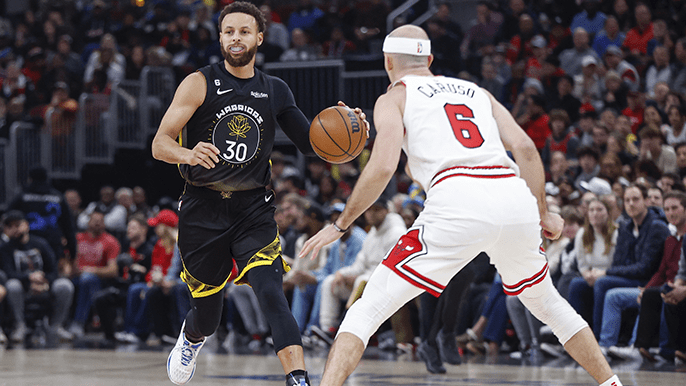
After falling behind by 17 early, the Warriors stormed back to take a lead into halftime, but turnovers prevented them from taking care of the Bulls.
Stephen Curry committed eight of Golden State’s 23 turnovers — three of which were travels. Chicago scored 31 points off those lost possessions.
The Warriors are now 0-6 in games in which they cough up at least 20 turnovers.
Golden State (21-22) didn’t take care of the ball, sent the Bulls to the free throw line too frequently, and allowed center Nikola Vucevic to match his career-high with 43 points.
Vucevic, (43 points, 13 rebounds, 4 assists, 4 steals) led the Bulls to a 130-118 victory, overcoming a 3-point barrage from the Warriors even without DeMar DeRozan.
Here are three takeaways from another GSW loss.
The Vucevic pendulum swung the wrong way
On the offensive end, Nikola Vucevic had his way at all three levels. He displayed impressive touch inside, sank a few jumpers from the midrange and was a constant threat in the pick-and-pop.
The Warriors couldn’t stop him. The best way to counter the center would be to put him in an endless mixer of pick-and-rolls to test his lateral ability defensively.
Golden State tried to attack Vucevic by putting him in actions, and he often hung back to protect against drives. The Warriors rarely punished him by making 3s, though.
In the fourth quarter, Stephen Curry scored six in a row, twice of which came against Vucevic after screens. Taking him off the dribble was clearly the best option.
On another pick-and-roll against Vucevic, Curry attracted a double team and found Looney for a layup line-level finish.
But Vucevic kept scoring, negating what he gave up on the defensive end. A baby hook inside over two defenders stalled a Warriors run late, and two more buckets put the Bulls up 124-109. A final putback iced the game officially.
Chicago played with the urgency Warriors had in the Alamodome
On one play early in the first quarter, Alex Caruso missed a tightly contested layup, but sprinted back on defense and knocked a Stephen Curry pass out of bounds to stop a Warriors fast break.
On another, Caruso fought for an offensive rebound, forcing Jordan Poole to knock it out of bounds and retaining possession for the Bulls.
Nothing about Caruso’s hustle in either moment ended up in the box score, but they were winning plays.
The Bulls, coming off three straight losses, played with the expected intensity that comes from such a stretch. They flew around defensively, deflecting often lazy Warriors passes.
Twice in Chicago’s first quarter 19-2 run, Bulls defenders intercepted Curry passes and went the other way for easy dunks.
Chicago set the tone. Nine of their 35 points in the first quarter came off seven Warriors turnovers. And it could have been even uglier, as the Bulls failed to capitalize on two GSW miscues.
The Bulls brought it early, and got rewarded with a 35-20 lead after one, forcing Golden State to trudge uphill.
Chicago’s early advantage wasn’t completely insurmountable, but it exposed one of Golden State’s bad habits: putting together 48 minutes of intensity.
Anthony Lamb has got to be one of the most productive two-way players
On the defensive end, he recovered from the right block to the left side of the rim, denying Derrick Jones Jr.’s dunk attempt. After picking up the loose ball he created, he pushed and finished with a spin move.
That highlight-reel play came after Lamb had already hit his first two 3-pointers and got fouled taking a third. As Caruso was seemingly everywhere, so was Lamb (and, to a lesser degree, Donte DiVincenzo).
Lamb added a gorgeous interior pass to Kevon Looney for an assist, but also committed a brutal foul against Derrick Jones Jr. while the Bulls forward was landing from a 3-point attempt.
All 14 of Lamb’s points came in the first half, but without his activity on both ends, the Warriors probably wouldn’t have had enough juice to compete with their bench units.